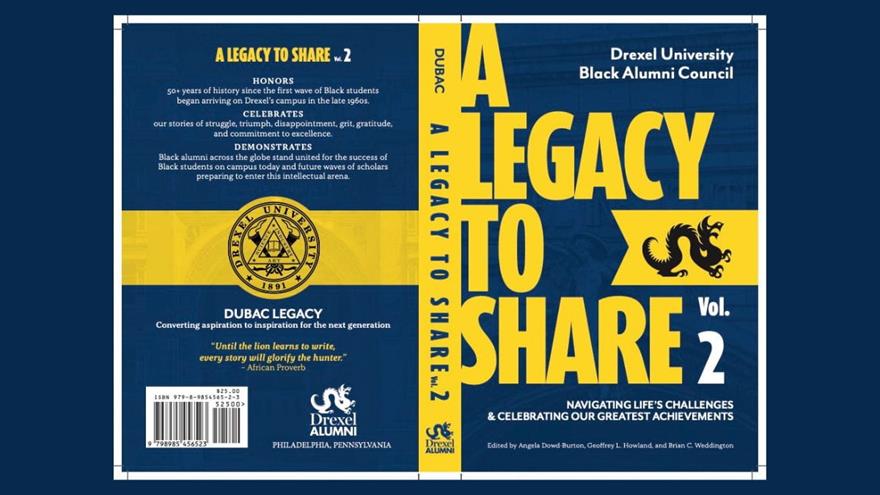This Collection of Alumni Stories is a Masterclass in Resilience

- Heard Around Campus — April 2025
- Carl June, MD, to Address Drexel College of Medicine Class of 2025 During Commencement
- Alumnus and Olympic Gold Medalist Justin Best to Address Graduates at Drexel’s University-wide Commencement Ceremony
- Celebration of Scholarship Event Highlights Transformative Impact on Students

The cover of the updated edition of "A Legacy to Share."
By: Lauren Hertzler Walsh, executive director of strategic communications in University Marketing and Communications
For generations, Black Drexel alumni have forged paths, broken barriers and lifted others as they rose. Now, their stories return to the spotlight in the second volume of “A Legacy to Share: Navigating Life’s Challenges & Celebrating Our Greatest Achievements” — a powerful anthology of lived experience, perseverance and community, published by the Drexel University Black Alumni Council (DUBAC).
The newest edition expands on the original volume released in 2022, showcasing the authentic and resilient voices of Drexel-credentialed CEOs, scientists, scholars, entrepreneurs and more. Proceeds support the DUBAC Endowed Scholarship Fund, which provides opportunities for current and future students.
Angela Dowd-Burton, a two-time Drexel graduate, University trustee, and the book’s chief editor, emphasizes the importance of honoring these alumni legacies. “I want to institutionalize what has been outstanding achievements by my fellow Dragons,” she explains. “They are ordinary people who have done some extraordinary things, and many if not most are humble as they climb one mountain after another.”
Often, Dowd-Burton says, these same alumni “find a way to reach back out and elevate the next generation.”
Take Jesse Rhodes Jr. ’98, for example. A longtime mentor to Chantee Butler ’13, Rhodes first connected with her through their respective involvement with the National Association of Black Accountants (NABA). Butler followed in Rhodes’ footsteps, not only serving as an officer of NABA’s Drexel chapter but also working at Deloitte after college, eventually launching her own business as a successful entrepreneur.
“I hope that by standing in my truth, other leaders, particularly young Black leaders, will see themselves in me,” Rhodes writes in “A Legacy to Share.” “Then, perhaps they will begin to believe that no matter their mistakes or limitations, they can do almost anything within their lifetime. Assisting them along their journey is my highest calling as a leader.”
DrexelNOW recently chatted with Rhodes, Butler and other contributors of the new volume to gain deeper insight into their personal and professional journeys. Below, they reflect on resilience, mentorship, advocacy, leadership and community building.
LEONARD COMMA ’92
Q: In “A Legacy to Share,” you reflect on some significant obstacles you’ve faced and withstood. What does resilience mean to you?
A: As human beings, we can sometimes get a little lost in our problems, and we swim in them, and they almost drown us. We have to get to a place where we can sort of come ashore, get out of that “problem swimming pool” long enough to just gain perspective. It is a courageous decision to take that step forward into the unknown. I call it a “mezzanine moment.” A mezzanine in a building is a transition place from the cold weather or the rain and everything else that’s outside. When you are in a bad place and you decide to get out of it, the first couple of steps that you take, you’re just entering into the mezzanine. Yes, you don’t know what’s next, but you’ve made a decision to step away from what was. In the mezzanine, your head can clear, and you are strong for getting yourself there.
Comma graduated with his bachelor’s degree in finance from Drexel in 1992. He began his career at Mobil and later worked as an executive at Jack in the Box, where he served from 2014 to 2020 as chairman and CEO. He currently serves as a mentor at The ExCo Group, an executive coach and leadership development firm.
JESSE RHODES JR. ’98
Q: In your excerpt, you note a lifechanging experience in high school, and how it’s impacted your perspective on mentorship. You often advise youth to not let adversity take them down a path of disruption. Why is this so important to you?
A: I want the world to know that if you do the work at your center, in your heart, and look within, address fear, set boundaries, provide and seek clarity, lean in and build that trust, you are unstoppable — no matter how much society, especially right now, will try to make you think otherwise. At the end of the day, the world is desperate to see the impact that only you can make. It’s challenging to say, “Yes, I’ve fallen.” And then you get back up and fall again, right? But it’s critical, it’s human. The best part of my story is sharing not only my falls but what I learned from those falls, and hoping what I’ve learned can provide guidance for others.
Rhodes is a 1998 graduate of Drexel, where he majored in accounting and management information systems and minored in African American studies. While a student, he was active on campus and founded the Drexel chapter of NABA and his fraternity Alpha Chi Alpha Chapter of Phi Beta Sigma Fraternity, Inc. An entrepreneur and a philanthropist, Rhodes’ career spans management roles at Amazon, Deloitte, Ernst & Young, Target and Walmart, and he’s recently published a book titled “Leadership Unlocked: Harness the Power of Your Ambition.”
BRIAN ELLIS ’05
Q: Even with your impressive credentials and hard-earned roles, you’ve discussed facing imposter syndrome throughout the years. How have you been able to leverage those experiences into advocacy work?
A: I am a kid from West Philadelphia. I first witnessed imposter syndrome when I moved to the suburbs in New Jersey for high school, and again as I started to really grow in my profession. Then again as I pursued a PhD, and again and again. I was so afraid of failing, and I kept wondering if I was smart enough to be where I was. My heart would pound during meetings. But, over the course of time, I started to realize that I did have something to contribute. I do belong. Everyone tends to question themselves, so I try to pay it forward to others, especially young people, to share my lived experiences with them and help them realize that they, too, belong.
Ellis currently serves as associate dean of academic programs administration at Drexel’s LeBow College of Business and executive director of the Goodwin College of Professional Studies. He earned his undergraduate degree in communications from Temple, his master’s degree in higher education from Drexel and his PhD in global leadership from Indiana Institute of Technology. One of the most satisfying endeavors of his career, he says, was founding the Drexel LeBow Building Relationships in Diverse Group Experiences (BRIDGE) program in 2012.
MONIQUETTA SHAFER ’11
Q: You’ve held many leadership roles and often seek out opportunities to mentor others inside and outside the workplace. What is one of your biggest pieces of advice for those who aspire to lead?
A: I am really big on self-confidence. When you walk into a room, the mindset that you need to have is that you are one of the smartest people in the room, and if you’re not one of the smartest people in the room, you’re one of the hardest working people in the room. You can’t control who is in the room, or how many people look like you in the room, or how others are going to perceive you in the room. But what you can control is your own perspective, and your own perspective will be what makes you successful at the end of the day. Self-confidence can go a very long way in overcoming a lot of obstacles and even sometimes knocking down barriers.
Shafer is a two-time graduate of Drexel, earning her undergraduate degree in biology in 2009 and her master’s degree in science of instruction in 2011. After successful stints at Integral Molecular and WuXi Advanced Therapies, and working on the side as an adjunct professor at various higher education institutions, she’s now pursuing her PhD in pharmacology at Cornell’s Medical School in New York City, where her research is focused on cancer metabolism.
CHANTEE BUTLER ’13
Q: As a student, you made sure to get involved in every way you could, from joining clubs and studying abroad to finding mentors and being a mentor. Why was doing this transformative for you?
A: I am a first-generation college graduate, and I was always seeking out people who could lend me advice or talk through big decisions. When I was in college, I knew it was important to have those types of people around me, in my corner, helping to lift me up. And even as a student, I found ways to also be a mentor — there is tremendous value in both the mentee and mentor roles. My motto is, “If you don’t see it, create it,” and I made sure to build my community. There is so much power in networking and relationships.
While an undergraduate student studying accounting and finance at Drexel, Butler landed co-ops at high-profile companies BlackRock, J.P. Morgan and Ernst & Young, and during her senior year, she helped found DUBAC. After graduating from Drexel 2013, she worked at Deloitte and then earned an MBA at Wharton, before landing managerial roles at Vanguard and DoorDash. She has since pursued her entrepreneurial journey full-time with all-natural skincare company Nayko Naturals and baseball training company Graveyard Mentality.
Drexel News is produced by
University Marketing and Communications.